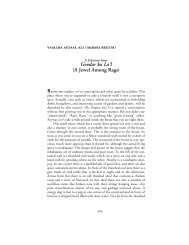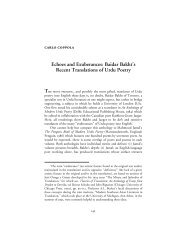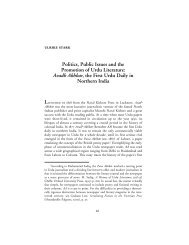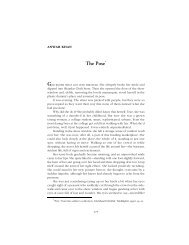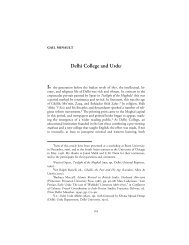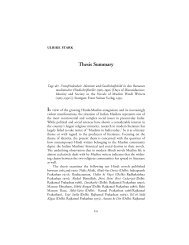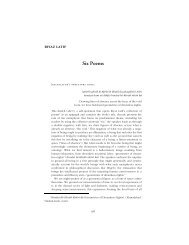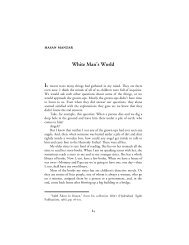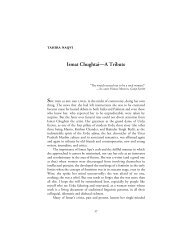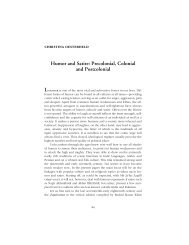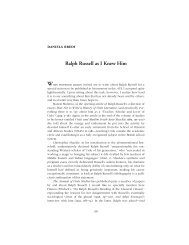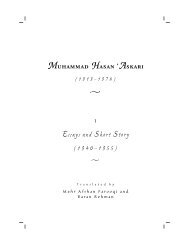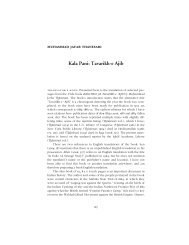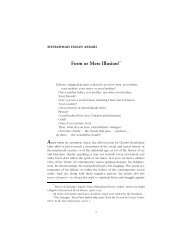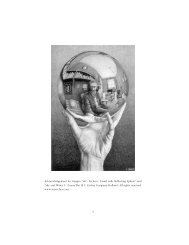In the Heat of Fratricide: The Literature of India's Partition Burning ...
In the Heat of Fratricide: The Literature of India's Partition Burning ...
In the Heat of Fratricide: The Literature of India's Partition Burning ...
You also want an ePaper? Increase the reach of your titles
YUMPU automatically turns print PDFs into web optimized ePapers that Google loves.
JASON FRANCISCO<br />
<strong>In</strong> <strong>the</strong> <strong>Heat</strong> <strong>of</strong> <strong>Fratricide</strong>: <strong>The</strong> <strong>Literature</strong><br />
<strong>of</strong> <strong>In</strong>dia’s <strong>Partition</strong> <strong>Burning</strong> Freshly<br />
(A Review Article)<br />
<strong>In</strong>dia <strong>Partition</strong>ed: <strong>The</strong> O<strong>the</strong>r Face <strong>of</strong> Freedom. Edited by MUSHIRUL<br />
HASAN. 2 volumes. New Delhi: Lotus, Roli Books, 1995.<br />
Orphans <strong>of</strong> <strong>the</strong> Storm: Stories on <strong>the</strong> <strong>Partition</strong> <strong>of</strong> <strong>In</strong>dia. Edited by SAROS<br />
COWASJEE and K.S. DUGGAL. New Delhi: UBSPD, 1995.<br />
Stories about <strong>the</strong> <strong>Partition</strong> <strong>of</strong> <strong>In</strong>dia. Edited by ALOK BHALLA. 3 volumes.<br />
Delhi: <strong>In</strong>dus, HarperCollins, 1994.<br />
This is not that long awaited dawn …<br />
—Faiz Ahmad Faiz<br />
I<br />
THE TRANSFER OF POPULATIONS surrounding <strong>the</strong> <strong>Partition</strong> <strong>of</strong> <strong>In</strong>dia on<br />
August 14–15, 1947 created at least ten million refugees, and resulted in at<br />
least one million deaths. This is, perhaps, as much as we can quantify <strong>the</strong><br />
tragedy. <strong>The</strong> bounds <strong>of</strong> <strong>the</strong> property loss, even if <strong>the</strong>y were known, could<br />
not encompass <strong>the</strong> devastation. <strong>The</strong> number <strong>of</strong> persons beaten, maimed,<br />
tortured, raped, abducted, exposed to disease and exhaustion, and o<strong>the</strong>rwise<br />
physically brutalized remains measureless. <strong>The</strong> emotional pain <strong>of</strong><br />
severance from home, family and friendships is by its nature immeasurable.<br />
Fifty years have passed and <strong>the</strong> <strong>Partition</strong> remains unrequited in <strong>the</strong><br />
historical experience <strong>of</strong> <strong>the</strong> Subcontinent.<br />
This is, in one sense, as it should be, for <strong>the</strong> truth remains that <strong>the</strong><br />
<strong>Partition</strong> unleashed barbarism so cruel, indeed so thorough in its cruelty,<br />
and complementary acts <strong>of</strong> compassion so magnificent—in short a com-<br />
227
228 • THE ANNUAL OF URDU STUDIES<br />
plex <strong>of</strong> impulses so pernicious, so heroic, so visceral, so human—that <strong>the</strong>y<br />
cannot easily be assimilated into normal life. Nei<strong>the</strong>r can <strong>the</strong>y be forgotten.<br />
And so, ingloriously, <strong>the</strong> experience <strong>of</strong> <strong>the</strong> <strong>Partition</strong> has been perhaps<br />
most clearly assimilated in <strong>the</strong> perpetuation <strong>of</strong> communal hostility within<br />
both <strong>In</strong>dia and Pakistan, for which it serves as <strong>the</strong> defining moment. <strong>The</strong><br />
hope for a different assimilation has motivated <strong>the</strong> recent spate <strong>of</strong> publications<br />
on <strong>the</strong> literature <strong>of</strong> <strong>the</strong> <strong>Partition</strong>—three major anthologies in <strong>the</strong><br />
past two years, with o<strong>the</strong>rs promised for <strong>the</strong> upcoming anniversary year.<br />
<strong>The</strong>se collections attest not only to <strong>the</strong> resurgence <strong>of</strong> literary interest in<br />
<strong>the</strong> <strong>Partition</strong>, and <strong>the</strong> emergence <strong>of</strong> <strong>Partition</strong> writings as a genre in modern<br />
South Asian literature in translation, but <strong>of</strong> a different approach to<br />
<strong>the</strong> event itself: an unbridled reclamation, a direct gaze at ugliness and<br />
survival. <strong>The</strong> hope is that a just remembrance mandates a better future.<br />
<strong>The</strong> historical benefits <strong>of</strong> <strong>the</strong>se publications are not for <strong>In</strong>dians and<br />
Pakistanis alone. <strong>In</strong> wider perspective, <strong>the</strong> <strong>Partition</strong> stands as <strong>the</strong><br />
archetype <strong>of</strong> what I would call nationalist fratricide, <strong>the</strong> conflict between<br />
people <strong>of</strong> a common cultural heritage—usually also <strong>the</strong> common subjects<br />
<strong>of</strong> foreign domination—in competition as “nations” for political control<br />
<strong>of</strong> land and government. (<strong>The</strong> o<strong>the</strong>r principal type <strong>of</strong> ethnic conflict,<br />
nationalist genocide, is characterized by state-sponsored persecution or<br />
slaughter <strong>of</strong> cultural or religious minorities—epitomized by <strong>the</strong> destruction<br />
<strong>of</strong> <strong>the</strong> European Jews). Those looking for historical lessons and for<br />
<strong>the</strong> depths <strong>of</strong> <strong>the</strong> human impact <strong>of</strong> current conflicts in <strong>the</strong> former<br />
Yugoslavia, in Chechnya, in Armenia and Azerbaijan, in Kurdistan, in<br />
Rwanda and Burundi, in <strong>the</strong> Sudan and in Israel, have much to gain in a<br />
close study <strong>of</strong> <strong>the</strong> South Asian <strong>Partition</strong>.<br />
A decent number, perhaps even a growing number <strong>of</strong> Pakistani and<br />
<strong>In</strong>dian historians will take exception to my characterization <strong>of</strong> <strong>the</strong><br />
<strong>Partition</strong> as a case <strong>of</strong> fratricide. <strong>In</strong> <strong>the</strong>ir view, Pakistanis and <strong>In</strong>dians were<br />
not and are not one people, but two—different in <strong>the</strong>ir ways <strong>of</strong> life, in<br />
<strong>the</strong>ir religious ideals and in <strong>the</strong>ir historical destiny—whose separation at<br />
<strong>the</strong> end <strong>of</strong> colonial rule was right, if regrettable in its execution. If one<br />
idea emerges from <strong>the</strong> body <strong>of</strong> <strong>Partition</strong> writings taken as a whole, it is<br />
this: Such a view is historically disingenuous, politically opportunistic,<br />
apologetic for criminal behavior committed in <strong>the</strong> name <strong>of</strong> “destiny,”<br />
compatible with resignation in <strong>the</strong> face <strong>of</strong> preventable suffering, and a<br />
mockery <strong>of</strong> religious values. Not that <strong>the</strong> anthologized literature is outwardly<br />
polemic—most <strong>of</strong> it is not—but <strong>the</strong> majority <strong>of</strong> it is necessarily<br />
politicized. And this is good: <strong>the</strong> <strong>Partition</strong> was an event so great in its<br />
human consequences that its literature rightly forces us to reckon sides
JASON FRANCISCO • 229<br />
and to choose. It is, after all, <strong>the</strong> literature’s job to raise <strong>the</strong> event psychologically<br />
and emotionally, to tie us into its complex <strong>of</strong> choices and pain.<br />
So knotted we may learn to discriminate <strong>the</strong> day when (God willing)<br />
fratricide no longer appears a reasonable approach to <strong>the</strong> fact, indeed <strong>the</strong><br />
joy <strong>of</strong> cultural difference.<br />
However unified <strong>the</strong> literature itself, though, important and even<br />
fractious differences remain between <strong>the</strong> editorial viewpoints <strong>of</strong> <strong>the</strong>se<br />
anthologies. Because <strong>the</strong>se differences are critical in determining <strong>the</strong><br />
climate <strong>of</strong> <strong>the</strong> literature’s reception, it is worthwhile to examine <strong>the</strong>m in<br />
some detail before turning to evocation and discussion <strong>of</strong> <strong>the</strong> texts <strong>the</strong>mselves.<br />
Cowasjee and Duggal’s fine collection <strong>of</strong> stories from Urdu, Hindi<br />
and Panjabi emerges as <strong>the</strong> least editorially weighted <strong>of</strong> <strong>the</strong> three. <strong>The</strong><br />
collection as a whole <strong>of</strong>fers what <strong>the</strong> stories individually <strong>of</strong>fer: <strong>the</strong> psychologies<br />
<strong>of</strong> characters in <strong>the</strong> midst <strong>of</strong> <strong>the</strong> events, <strong>the</strong> drama and pathos<br />
<strong>of</strong> <strong>the</strong>ir human impact, trauma in various hues. It <strong>of</strong>fers, plainly, <strong>the</strong><br />
plainspoken truths <strong>of</strong> <strong>the</strong> <strong>Partition</strong> experience, namely that it was a maze<br />
<strong>of</strong> brutality, loss, jealousy, cupidity, cunning, death by butchery, by rape,<br />
by deracination. Cowasjee and Duggal’s <strong>In</strong>troduction is not particularly<br />
analytical philosophically or politically. If anything <strong>the</strong> collection rides<br />
editorially on <strong>the</strong> disgust, disillusionment and horror that were central<br />
concerns <strong>of</strong> <strong>the</strong> Progressive Writers’ movement, <strong>the</strong> dominant literary<br />
school in South Asian literature from <strong>the</strong> thirties through <strong>the</strong> forties, and<br />
<strong>the</strong> single greatest literary origin <strong>of</strong> <strong>Partition</strong> writing. Both Cowasjee and<br />
Duggal were well known Progressive writers—Duggal’s work in particular<br />
achieving critical acclaim—and it comes as no surprise that <strong>the</strong>ir collection<br />
should stand as a clear statement <strong>of</strong> <strong>the</strong> Progressive perspective on<br />
<strong>the</strong> <strong>Partition</strong>. <strong>In</strong> general <strong>the</strong> collection presents Progressive writing at its<br />
best, avoiding <strong>the</strong> sometimes melodramatic excesses <strong>of</strong> Progressive sentiment,<br />
<strong>of</strong>fering a selection <strong>of</strong> stories that is nuanced, rich, difficult.<br />
Bhalla has compiled an ambitious anthology, successfully hunting<br />
down works from every major and some minor <strong>In</strong>dian languages, presenting<br />
<strong>the</strong> perspective <strong>of</strong> Muslim, Hindu and Sikh writers. <strong>The</strong> anthology is<br />
not comprehensive, but does succeed in representing diverse points <strong>of</strong><br />
view, bringing toge<strong>the</strong>r some <strong>of</strong> <strong>the</strong> best authors and <strong>the</strong> best stories.<br />
Bhalla wants more than this achievement, however. He intends his<br />
collection to stand as a categorical indictment <strong>of</strong> communal hatred, as<br />
well as a vindication <strong>of</strong> his own Gandhian views, and <strong>of</strong> Gandhi himself.<br />
Thus Bhalla <strong>of</strong>fers himself in his <strong>In</strong>troduction as a committed partisan <strong>of</strong><br />
<strong>the</strong> one-people perspective: that Hindus, Muslims and Sikhs, Pakistanis,
230 • THE ANNUAL OF URDU STUDIES<br />
<strong>In</strong>dians and Bangladeshis, are culturally a single people with different<br />
languages, religions and customs. <strong>The</strong> evidence <strong>of</strong> this single peoplehood<br />
is, in Bhalla’s eyes, overwhelming: evident in <strong>the</strong> deep intermingling <strong>of</strong><br />
lives, <strong>of</strong> cultural expression, <strong>of</strong> ethos in everyday life, in literature, music,<br />
architecture, commerce. <strong>The</strong> violence <strong>of</strong> <strong>the</strong> <strong>Partition</strong> occurred because a<br />
single people was torn into separate nations in a spasm <strong>of</strong> religious hysteria,<br />
self-interest, panic, bloodlust, greed.<br />
Bhalla’s own focus on <strong>the</strong> phenomenology <strong>of</strong> <strong>the</strong> <strong>Partition</strong> places him<br />
squarely within <strong>the</strong> Progressive tradition. But where <strong>the</strong> Progressives<br />
simply <strong>of</strong>fer shock and outrage at <strong>the</strong> failure <strong>of</strong> civilized behavior, and<br />
leave <strong>the</strong> <strong>Partition</strong> as an unrequited event, Bhalla <strong>of</strong>fers along with his<br />
quotient <strong>of</strong> shock and outrage a philosophy to redeem both <strong>the</strong> past and<br />
<strong>the</strong> future. He observes, trenchantly, that cultural chauvinism arises when<br />
inclusion and exclusion become <strong>the</strong> mediating criteria according to which<br />
a culture is defined: “[e]ntrapped by <strong>the</strong> logic <strong>of</strong> exclusive nationalism,<br />
[migrants] learn[ed] too late that nei<strong>the</strong>r <strong>the</strong> community <strong>of</strong> religion nor<br />
<strong>the</strong> shared idioms <strong>of</strong> language can <strong>of</strong>fer a secure guarantee <strong>of</strong> a just society<br />
and so become <strong>the</strong> basis <strong>of</strong> a firm identity. Religious and linguistic definitions<br />
… succeed only in establishing shifting grounds for <strong>the</strong> inclusion <strong>of</strong><br />
some and making all o<strong>the</strong>rs expendable … [t]hese definitions … can be<br />
manipulated for <strong>the</strong> purposes <strong>of</strong> political power by <strong>the</strong> unscrupulous”<br />
(<strong>In</strong>troduction, vol. I, p. xxiii). Bhalla’s true concern thus is articulating<br />
<strong>the</strong> rudiments <strong>of</strong> a just society. Bhalla does not get very far in such an<br />
articulation, but indicates that achieving a just society demands, at <strong>the</strong><br />
least, exploding myths <strong>of</strong> cultural purity, and denuding any selfenchantment<br />
that “sublime feelings about our particular faiths alone<br />
[could] lead us to social justice” (ibid., p. xiv). Stated positively, social<br />
justice proceeds from admitting <strong>the</strong> selfish error <strong>of</strong> construing ano<strong>the</strong>r<br />
community as essentially o<strong>the</strong>r, from admitting our essential connectedness<br />
to one ano<strong>the</strong>r, and from correct remembrance <strong>of</strong> our mistakes.<br />
Making human connectedness and self-critical memory central to <strong>the</strong><br />
building <strong>of</strong> a just society, we fence ourselves <strong>of</strong>f from any suspicion that<br />
ano<strong>the</strong>r community is less worthy <strong>of</strong> justice, which is to say less holy,<br />
than our own. First and foremost, with regard to <strong>the</strong> <strong>Partition</strong>, Bhalla<br />
implores us to accept “<strong>the</strong> absurdity <strong>of</strong> constructing fundamental entities<br />
called <strong>the</strong> Muslims or <strong>the</strong> Hindus who could easily be separated into<br />
nation states” (ibid., p. xix), and that <strong>the</strong> <strong>Partition</strong> forced members <strong>of</strong><br />
both communities “to leave behind a human world … in return [for] an<br />
empty allegory <strong>of</strong> a religious community” (ibid., p. xxii).<br />
Approaching <strong>the</strong> <strong>Partition</strong> as a task <strong>of</strong> defining social justice is doubt-
JASON FRANCISCO • 231<br />
less right, and Bhalla deserves commendation. Bhalla begins to stray,<br />
however, with <strong>the</strong> suggestion that religious faith, cultural pride, <strong>the</strong><br />
essential connectedness <strong>of</strong> Muslim, Hindu and Sikh life in <strong>the</strong> Subcontinent,<br />
<strong>the</strong> incomprehensibility <strong>of</strong> <strong>the</strong> notion that <strong>the</strong>re was always hatred<br />
between <strong>the</strong> communities in everyday life, should toge<strong>the</strong>r have been<br />
enough to prevent <strong>the</strong> degeneration into violence during <strong>the</strong> <strong>Partition</strong>.<br />
“Why did we not, as a people, resist?” Bhalla asks incredulously.<br />
<strong>The</strong> stories <strong>the</strong>mselves and a basic knowledge <strong>of</strong> history suggest a<br />
number <strong>of</strong> answers for <strong>the</strong> violence and <strong>the</strong> lack <strong>of</strong> resistance that are<br />
perfectly compatible with <strong>the</strong> one-people approach. First, <strong>the</strong> political<br />
climate <strong>of</strong> <strong>the</strong> freedom struggle was violent to begin with. <strong>The</strong> British<br />
government met <strong>the</strong> <strong>In</strong>dian nationalist movement with violent repression<br />
consistently throughout <strong>the</strong> freedom struggle, from <strong>the</strong> Khilafat/Noncooperation<br />
activism <strong>of</strong> 1918–22, through <strong>the</strong> Noncooperation movement <strong>of</strong><br />
1930–34, and <strong>the</strong> widespread revolts following <strong>the</strong> arrests <strong>of</strong> Gandhi,<br />
Nehru, Azad and o<strong>the</strong>r leaders at <strong>the</strong> start <strong>of</strong> <strong>the</strong> Quit <strong>In</strong>dia movement in<br />
1942. <strong>In</strong> addition <strong>the</strong>re were continuous, if rogue acts <strong>of</strong> revolutionary<br />
terrorism, as well as trade union militancy, communist agitation, and<br />
regular outbreaks <strong>of</strong> communal rioting. <strong>The</strong> militant voices <strong>of</strong> Muslim<br />
separatism became exceedingly important, as we know, after <strong>the</strong> 1940<br />
Lahore Resolution, in addition to <strong>the</strong> voices <strong>of</strong> Hindu chauvinism in <strong>the</strong><br />
Hindu Mahasabha and <strong>the</strong> RSS, whose message dovetailed with <strong>the</strong> more<br />
moderate voices <strong>of</strong> <strong>the</strong> Hindu religious revival that began in <strong>the</strong> nineteenth<br />
century. Add to <strong>the</strong> political turbulence <strong>the</strong> economic suffering <strong>the</strong><br />
country experienced under <strong>the</strong> British regime—<strong>the</strong> most obvious example<br />
<strong>of</strong> which was a series <strong>of</strong> devastating famines causing an estimated thirty<br />
million deaths between 1857 and 1947, with three million in 1943<br />
alone—and <strong>the</strong> result is a condition <strong>of</strong> extraordinary explosiveness. It is<br />
quite possible that no force in <strong>the</strong> world could have prevented <strong>the</strong><br />
ignition <strong>of</strong> such a concentration <strong>of</strong> social and political discontents.<br />
Second, <strong>the</strong> exchange <strong>of</strong> populations during <strong>the</strong> <strong>Partition</strong> introduced a<br />
social vacuum uniquely habitable to thugs and goons. If <strong>the</strong> aggressions <strong>of</strong><br />
an organized few are usually enough to frighten <strong>the</strong> unorganized many in<br />
times <strong>of</strong> stability, <strong>the</strong>y are enough to terrorize in times <strong>of</strong> social upheaval.<br />
Thus, self-protection alone must account for a great deal <strong>of</strong> <strong>the</strong><br />
nonresistance. Such self-protection, while perhaps not noble, is also not a<br />
vice. Third, <strong>the</strong>re was legitimate confusion over <strong>the</strong> future <strong>of</strong> <strong>the</strong> country<br />
given <strong>the</strong> erratic policy <strong>of</strong> <strong>the</strong> British government and <strong>the</strong> brinksmanship<br />
between <strong>the</strong> Muslim League and <strong>the</strong> Congress. Likewise <strong>the</strong>re was<br />
legitimate confusion over cultural identity, particularly given that tensions
232 • THE ANNUAL OF URDU STUDIES<br />
by 1947 had risen to a point where extreme views had managed to win <strong>the</strong><br />
tacit if not explicit support <strong>of</strong> moderates. Confusion is eminently<br />
permissive <strong>of</strong> ethical failure. Fourth, <strong>the</strong> incendiary quality <strong>of</strong> media<br />
coverage only hastened <strong>the</strong> collapse <strong>of</strong> good judgment. Finally, some <strong>of</strong><br />
<strong>the</strong> violence seems to have arisen situationally, not from deeply held<br />
communal prejudice, but from momentary rage. Some acts <strong>of</strong> retaliatory<br />
violence may have proceeded from <strong>the</strong> error in judgment <strong>of</strong> people who<br />
surrendered to a frenzy <strong>of</strong> anger, but who were not, at heart, hateful.<br />
All five violence-begetting elements—<strong>the</strong> ambient political and social<br />
violence, <strong>the</strong> terror <strong>of</strong> an organized few and <strong>the</strong> self-protective reaction <strong>of</strong><br />
<strong>the</strong> many, political and cultural confusion, inflammatory media<br />
reportage, <strong>the</strong> natural retaliatory impulse in <strong>the</strong> face <strong>of</strong> violence—do not<br />
in any way contradict <strong>the</strong> <strong>the</strong>sis <strong>of</strong> shared history and essential amity<br />
between groups. But Bhalla fails to consider <strong>the</strong>se or o<strong>the</strong>r sources <strong>of</strong><br />
violence when he asks, “Why did we not, as a people, resist?” Ra<strong>the</strong>r he<br />
asks <strong>the</strong> question as if <strong>the</strong> only answer were ei<strong>the</strong>r that <strong>the</strong> violence<br />
remains essentially inexplicable, or that <strong>the</strong> <strong>Partition</strong> shows human nature<br />
itself intrinsically weak and depraved. For Bhalla <strong>the</strong>re is apparently no<br />
explanation for <strong>the</strong> violence, short <strong>of</strong> a nihilistic conclusion about human<br />
nature, which Bhalla is loa<strong>the</strong> to make. <strong>In</strong>deed it seems that Bhalla<br />
considers himself noble for not making such a conclusion, which <strong>the</strong><br />
horror <strong>of</strong> <strong>the</strong> events would warrant.<br />
<strong>In</strong> fact Bhalla’s question is rhetorical, and he <strong>of</strong>fers only naïve answers<br />
because <strong>the</strong> question is a sieve into his own agenda: rehabilitating Gandhi<br />
as an ethical model and a martyr <strong>of</strong> <strong>the</strong> struggle against hatred. Directly<br />
following his query about <strong>the</strong> failure <strong>of</strong> resistance, Bhalla asks, “Why did<br />
we not follow Gandhi, as we had done <strong>of</strong>ten before, on his pilgrimage to<br />
Noakhali and ga<strong>the</strong>r around him at Srirrampur to pledge to uphold <strong>the</strong><br />
peace?” (ibid., p. xiv). <strong>The</strong> only way Bhalla can ask this question seriously<br />
is if Gandhi has himself become a mythical figure <strong>of</strong> universal unification.<br />
<strong>The</strong> “we” <strong>of</strong> Bhalla’s question cries for definition: not only did Gandhi<br />
not enjoy <strong>the</strong> uncritical support <strong>of</strong> <strong>the</strong> Congress leadership, much <strong>of</strong><br />
which rejected his Luddite economics and his political strategy (not to<br />
mention his personal idiosyncrasies), but his detractors included B.R.<br />
Ambedkar, who criticized him for his support <strong>of</strong> <strong>the</strong> varøa system and<br />
gender inequalities, and mainstream Muslims who were justifiably<br />
suspicious <strong>of</strong> his trading on Hindu symbolism to rally political support.<br />
To make Gandhi into a model universalist is to take him entirely on his<br />
own terms, which is a sport for <strong>the</strong> gullible. I do not think, however, that<br />
Bhalla is merely a dupe <strong>of</strong> <strong>the</strong> Gandhian myth. Ra<strong>the</strong>r I believe that he
JASON FRANCISCO • 233<br />
himself, while asserting that secularism is <strong>the</strong> only acceptable political<br />
solution to <strong>the</strong> challenge <strong>of</strong> multi-culturalism, is sympa<strong>the</strong>tic with<br />
Gandhi’s personal religious orthodoxy, and with a Hindu religiosity<br />
modeled on it. Bhalla says, in effect, that Gandhi represents <strong>the</strong> pinnacle<br />
<strong>of</strong> Hindu ethical consciousness, which is a pure achievement beyond its<br />
political manifestation, and so deserves to be embraced by members <strong>of</strong> all<br />
faiths as a solution compatible with secularism to <strong>the</strong> problem <strong>of</strong> communal<br />
hatred.<br />
Because I respect that Bhalla <strong>of</strong>fers his opinions sincerely, I hesitate to<br />
call <strong>the</strong>m arrogant. But <strong>the</strong> question remains open whe<strong>the</strong>r Gandhi’s<br />
legacy can be laundered so that Gandhi emerges as a prophet <strong>of</strong> social<br />
inclusiveness acceptable to secularists and to non-Hindus. Trying to make<br />
Gandhian Hinduism <strong>the</strong> true path <strong>of</strong> ethical universalism, and <strong>the</strong> natural<br />
handmaiden <strong>of</strong> political secularism is a dicey proposition, if only in <strong>the</strong><br />
effort to be true to <strong>the</strong> historical record, as Bhalla insists we must be.<br />
Whatever Gandhi’s personal religious feelings, his politics were not evident<br />
to all parties as <strong>the</strong> politics <strong>of</strong> universal love. And even his personal<br />
ethics are not universally lovable, at least as Gandhi presents <strong>the</strong>m in his<br />
Autobiography, where he frequently appears egocentric, rigid, unforgiving<br />
and exceedingly authoritarian. That aside, Bhalla’s efforts are certainly<br />
questionable in <strong>the</strong> current political climate, in which <strong>the</strong>re is no more<br />
guarantee than <strong>the</strong>re was fifty years ago that Gandhi will not be revered<br />
narrowly as a Hindu hero ra<strong>the</strong>r than as a Hindu universalist. Bhalla risks<br />
playing into <strong>the</strong> hands <strong>of</strong> those fundamentalists he opposes.<br />
<strong>The</strong> least that Bhalla owes his readers in <strong>the</strong> way <strong>of</strong> Gandhi-<strong>the</strong>rapy is<br />
a thorough criticism <strong>of</strong> <strong>the</strong> Hindu fundamentalism that glorifies Ghandi.<br />
Bhalla’s analysis <strong>of</strong> Hindu fundamentalist history is curiously abrupt, and<br />
<strong>of</strong>f <strong>the</strong> mark. First, <strong>the</strong> problem is not that Hindu fundamentalist historians<br />
falsely construct entities called Hindus and Muslims, as Bhalla claims,<br />
but that <strong>the</strong>y distort differences that do exist for <strong>the</strong> sake <strong>of</strong> creating<br />
enmity. Second, Bhalla fails to consider that not only was Muslim resistance<br />
to <strong>the</strong> Hinduized politics <strong>of</strong> <strong>the</strong> <strong>In</strong>dian National Congress not a<br />
betrayal <strong>of</strong> <strong>In</strong>dia, as <strong>the</strong> Hindu historians claim, but it was a legitimate<br />
forum <strong>of</strong> resistance. That is, if Gandhi’s Hindu religiosity formed a legitimate,<br />
indeed desirable basis <strong>of</strong> resistance, <strong>the</strong>n some form <strong>of</strong> Muslimcentered<br />
consciousness must also be admitted. Third, and perhaps most<br />
seriously, Bhalla has <strong>the</strong> temerity to attack current Pakistani historians<br />
who justify <strong>the</strong> violence <strong>of</strong> <strong>the</strong> <strong>Partition</strong> in defense <strong>of</strong> Pakistan as an<br />
historical destiny, without decrying <strong>the</strong> ways that hind∑tv≥ history is<br />
currently used to justify <strong>the</strong> persecution <strong>of</strong> <strong>the</strong> Muslim minority in
234 • THE ANNUAL OF URDU STUDIES<br />
<strong>In</strong>dia—indeed without mentioning <strong>the</strong> appalling levels <strong>of</strong> communal violence<br />
in <strong>the</strong> 1990s that such history has abetted. We are left to wonder<br />
whe<strong>the</strong>r it is merely accidental that Bhalla’s Gandhian humanism seems<br />
remarkably like <strong>In</strong>dian nationalism, more concerned with discrediting<br />
Pakistani ideology than setting its own house right.<br />
Where Bhalla positions himself as a lone ethical hero trapped in a<br />
universe <strong>of</strong> parochial fiends, and <strong>the</strong>n fails to live up to <strong>the</strong> self-critical<br />
standards he expects <strong>of</strong> o<strong>the</strong>rs, Mushirul Hasan emerges as a sober critic<br />
who clearly understands <strong>the</strong> gravity <strong>of</strong> <strong>the</strong> ethical failure <strong>the</strong> <strong>Partition</strong><br />
played out—without self-righteousness. <strong>The</strong> clear editorial strength <strong>of</strong><br />
Hasan’s new volumes is his willingness to peer critically into <strong>the</strong> political<br />
tectonics <strong>of</strong> <strong>the</strong> <strong>Partition</strong> from <strong>the</strong> Muslim perspective, with a courage<br />
that delineates precisely who won and who lost with <strong>the</strong> partition <strong>of</strong> <strong>the</strong><br />
country. Hasan has collected two thoughtful, compelling volumes <strong>of</strong> literary<br />
and documentary material from Urdu, Hindi, Panjabi and English,<br />
that enable a deep consideration <strong>of</strong> <strong>the</strong> social configuration <strong>of</strong> <strong>the</strong><br />
<strong>Partition</strong>, largely but not exclusively from <strong>the</strong> Muslim perspective.<br />
Toge<strong>the</strong>r with <strong>the</strong> collection <strong>of</strong> academic papers he edited in 1993, <strong>In</strong>dia’s<br />
<strong>Partition</strong>: Process, Strategy and Mobilization (New Delhi: Oxford), <strong>the</strong><br />
new volumes will remain a landmark in <strong>Partition</strong> studies for some time to<br />
come.<br />
Hasan’s scholarship into <strong>the</strong> politics that won Pakistan hovers in <strong>the</strong><br />
background <strong>of</strong> his project in <strong>the</strong>se volumes, and provides a light on events<br />
that <strong>the</strong> stories <strong>the</strong>mselves generally do not shine, namely <strong>the</strong> politics <strong>of</strong><br />
<strong>the</strong> Muslim League’s success, and <strong>the</strong> political brinksmanship <strong>of</strong><br />
Muhammad Ali Jinnah, <strong>the</strong> Congress leadership, Lord Mountbatten and<br />
<strong>the</strong> British government. Nei<strong>the</strong>r Hasan nor his colleagues question that<br />
<strong>the</strong> status <strong>of</strong> <strong>the</strong> Muslim minority raised a nearly intractable dilemma in<br />
<strong>the</strong> context <strong>of</strong> rising <strong>In</strong>dian nationalist consciousness: such consciousness<br />
grew, on <strong>the</strong> one hand, against <strong>the</strong> colonial regime, but on <strong>the</strong> o<strong>the</strong>r<br />
along <strong>the</strong> contours <strong>of</strong> internal cultural differences. Where <strong>the</strong> colonial<br />
status quo involved reducing all groups to minority parties, encouraging<br />
<strong>the</strong>m to make <strong>the</strong>ir separate peaces with <strong>the</strong> British regime—gaining<br />
privilege, protection, or being ignored—<strong>In</strong>dian nationalists divided<br />
between builders <strong>of</strong> an integrated, pan-<strong>In</strong>dian coalition, and builders <strong>of</strong> a<br />
mass majority with pronounced minority exclusion. Hasan describes <strong>the</strong><br />
Muslim League’s three-pronged response, which succeeded in mobilizing<br />
<strong>the</strong> Muslim middle and working classes, and polarizing <strong>the</strong> overall political<br />
climate after <strong>the</strong> Lahore Resolution. First, <strong>the</strong> League galvanized <strong>the</strong><br />
fears <strong>of</strong> <strong>the</strong> Urdu-speaking muh≥jir bourgeoisie that <strong>the</strong>y were in direct
JASON FRANCISCO • 235<br />
competition with and mortally outnumbered by a tightly knit, conspiratorial<br />
Hindu baniy≥-class. Second, it swayed self-seeking local landlords<br />
and political henchmen, particularly in <strong>the</strong> Panjab, by capitalizing on <strong>the</strong><br />
electoral miscalculations <strong>of</strong> its opponents (<strong>the</strong> Congress, <strong>the</strong> Panjabi<br />
Unionist Party), and by secretly promising not to enact land reforms in<br />
Muslim controlled areas. Third, it sent pµrs toge<strong>the</strong>r with Aligarh students<br />
to canvass <strong>the</strong> countryside. <strong>The</strong> pµrs, whom <strong>the</strong> League paid tens <strong>of</strong> thousands<br />
<strong>of</strong> rupees, convinced large numbers <strong>of</strong> people that dedication to <strong>the</strong><br />
Muslim League was a religious duty. <strong>The</strong> students transformed <strong>the</strong><br />
League’s popular appeal into an anti-Hindu hysteria, drumming up a<br />
paranoia that could only be solved by Muslim secession from <strong>the</strong> rest <strong>of</strong><br />
<strong>In</strong>dia and <strong>the</strong> creation <strong>of</strong> a fundamentalist <strong>the</strong>ocracy to save <strong>the</strong><br />
“endangered” Muslim people.<br />
What Hasan and o<strong>the</strong>rs call into question is how much Jinnah actually<br />
wanted partition. <strong>The</strong>y suggest that Jinnah after 1937 was hemmed in<br />
on two sides: by provincial Muslim bosses, particularly in <strong>the</strong> Panjab, and<br />
by <strong>the</strong> provincial Congress ministries, which sought on <strong>the</strong> strength <strong>of</strong><br />
<strong>the</strong> Congress’s showing in <strong>the</strong> 1937 elections to marginalize Jinnah and<br />
<strong>the</strong> League. <strong>The</strong> secular, liberal Jinnah, according to <strong>the</strong> new thinking,<br />
was imperfectly committed, even perhaps uncommitted, but in any case<br />
far less committed than <strong>the</strong> Muslim religious right, to <strong>the</strong> two-nation<br />
<strong>the</strong>ory <strong>of</strong> essential cultural and political differences between Hindus and<br />
Muslims, and to <strong>the</strong> picture <strong>of</strong> Islam in danger—<strong>of</strong>, that is, Muslims as<br />
hapless victims <strong>of</strong> communal riots perpetrated by a hostile Hindu majority,<br />
<strong>of</strong> <strong>the</strong> Muslim salariat in a losing battle with <strong>the</strong> dominant caste-<br />
Hindu salariat, and <strong>of</strong> Urdu under siege. (<strong>In</strong>cidentally, he was also far less<br />
committed than <strong>the</strong> Hindu religious right, which viciously attacked not<br />
only Muslims but secularists also). <strong>In</strong> <strong>the</strong> revisionist perspective, Jinnah<br />
did not embrace religious mobilization and <strong>the</strong> demand for partition<br />
because he was wedded to a sovereign Muslim religious homeland, but<br />
because he needed to win support for <strong>the</strong> League in Muslim dominated<br />
areas, and to break <strong>the</strong> Congress’ grip on <strong>the</strong> post-independence central<br />
government. <strong>In</strong> short, Jinnah made a bargaining chip <strong>of</strong> <strong>the</strong> spectre <strong>of</strong><br />
partition in his effort to make a place for himself and <strong>the</strong> League in a<br />
united, free <strong>In</strong>dia. Jinnah’s <strong>In</strong>dia would have been characterized by<br />
provincial autonomy, benefiting <strong>the</strong> League in <strong>the</strong> Muslim dominated<br />
provinces, accompanied by parity between <strong>the</strong> League and <strong>the</strong> Congress<br />
at a weak center. Additionally, separate Muslim provinces within a united<br />
<strong>In</strong>dia would facilitate <strong>the</strong> League’s o<strong>the</strong>r principal charge, <strong>the</strong> protection<br />
<strong>of</strong> <strong>In</strong>dian Muslims where <strong>the</strong>y were in <strong>the</strong> minority.
236 • THE ANNUAL OF URDU STUDIES<br />
For <strong>the</strong> Congress, <strong>the</strong> reverse would be true: a partition <strong>of</strong> <strong>the</strong> country<br />
would certify its control over a strong central government. Such control,<br />
Hasan and his corps argue, ultimately proved more important to <strong>the</strong><br />
Congress than <strong>In</strong>dian unity. <strong>The</strong> genius <strong>of</strong> <strong>the</strong> Congress strategy was to<br />
force Jinnah to wear <strong>the</strong> black mark <strong>of</strong> division, putting up a façade <strong>of</strong><br />
unity while deliberately pushing Jinnah toward his Pakistan. Thus both<br />
Nehru’s and Gandhi’s reactions to <strong>the</strong> Lahore Resolution were from <strong>the</strong><br />
beginning calculating. Shortly after <strong>the</strong> passage <strong>of</strong> <strong>the</strong> Resolution,<br />
Gandhi, realizing that partition promised fratricide, effectively equated<br />
his nonviolence with nonprotection <strong>of</strong> <strong>the</strong> innocent, and with a willingness<br />
to accept blood as <strong>the</strong> price <strong>of</strong> <strong>the</strong> Congress’ leadership:<br />
Unless <strong>the</strong> rest <strong>of</strong> <strong>In</strong>dia wishes to engage in internal fratricide, <strong>the</strong><br />
o<strong>the</strong>rs will have to submit to <strong>the</strong> Muslim dictation, if <strong>the</strong> Muslims<br />
will resort to it…. <strong>The</strong> Muslims must have <strong>the</strong> same right to selfdetermination<br />
that <strong>the</strong> rest <strong>of</strong> <strong>In</strong>dia has. We are at present a joint<br />
family. Any member may claim a division…. As a man <strong>of</strong> nonviolence,<br />
I cannot forcibly resist <strong>the</strong> proposed partition if <strong>the</strong><br />
Muslims <strong>of</strong> <strong>In</strong>dia really [insist] upon it [sic]…. My whole soul rebels<br />
against <strong>the</strong> idea that Hinduism and Islam represent two antagonistic<br />
cultures and doctrines…. But that is my belief. I cannot thrust it<br />
down <strong>the</strong> throats <strong>of</strong> <strong>the</strong> Muslims who think that <strong>the</strong>y are a different<br />
nation. 1<br />
Likewise, on April 15, 1940, Nehru was reported to be<br />
pleased, not because he liked [<strong>the</strong> Lahore Resolution]—on <strong>the</strong><br />
contrary he considered it to be <strong>the</strong> most insane suggestion—but<br />
because it very much simplified <strong>the</strong> problem. <strong>The</strong>y were now able to<br />
get rid <strong>of</strong> <strong>the</strong> demands about proportionate representation in legislatures,<br />
services, cabinets, etc…. [He] asserted that if people wanted<br />
such things as suggested by <strong>the</strong> Muslim League at Lahore … <strong>the</strong>y<br />
and people like him[self] … could not live toge<strong>the</strong>r in <strong>In</strong>dia. 2<br />
1 Asim Roy, “<strong>The</strong> High Politics <strong>of</strong> <strong>In</strong>dia’s <strong>Partition</strong>: <strong>The</strong> Revisionist<br />
Perspective,” in Mushirul Hasan, ed. <strong>In</strong>dia’s <strong>Partition</strong>: Process, Strategy and<br />
Mobilization (New Delhi: Oxford, 1993), p.125.<br />
2 Ibid.
JASON FRANCISCO • 237<br />
So too, Maulana Abul Kalam Azad, in <strong>the</strong> thirty pages <strong>of</strong> his 1957<br />
memoir, <strong>In</strong>dia Wins Freedom, disclosed in 1988, points his finger at<br />
Nehru’s responsibility, and gives <strong>the</strong> lie to <strong>the</strong> myth <strong>of</strong> “<strong>the</strong> Congress for<br />
Unity, <strong>the</strong> League for <strong>Partition</strong>”:<br />
I warned Jawaharlal [in 1946] that … if we agreed to <strong>Partition</strong> …<br />
[t]he verdict would be that <strong>In</strong>dia was not divided by <strong>the</strong> Muslim<br />
League but by <strong>the</strong> Congress. 3<br />
Finally, in 1960, Nehru himself made <strong>the</strong> opprobrious confession: “<strong>The</strong><br />
truth is that … <strong>the</strong> plan for partition <strong>of</strong>fered a way out and we took it.”<br />
Jinnah, along with <strong>the</strong> Congress leadership, accepted <strong>the</strong> Cabinet<br />
Mission Plan in June, 1946, which did not call for partition. <strong>The</strong><br />
Congress <strong>the</strong>n destroyed <strong>the</strong> option by refusing to accede to parity with<br />
<strong>the</strong> League in <strong>the</strong> interim government, or to a compulsory grouping <strong>of</strong><br />
<strong>the</strong> six Muslim provinces. <strong>In</strong> 1947, Jinnah was willing to accept a united<br />
<strong>In</strong>dia with a “dominion” <strong>of</strong> <strong>the</strong> six provinces. So it was that Jinnah<br />
remained obstinate in public and considerably more pliable behind <strong>the</strong><br />
scenes. <strong>The</strong> final outcome <strong>of</strong> negotiations, mandating <strong>the</strong> dual transfer <strong>of</strong><br />
power to a bifurcated Pakistan and an <strong>In</strong>dian state, followed from<br />
Congress policy and <strong>the</strong> British government’s acquiescence to it. 4<br />
Whe<strong>the</strong>r <strong>the</strong> League, <strong>the</strong> Congress or <strong>the</strong> British were <strong>the</strong> most<br />
culpable in <strong>the</strong> high level brinksmanship, <strong>the</strong> new scholarship makes clear<br />
<strong>the</strong> extraordinary recklessness <strong>of</strong> <strong>the</strong> demand for partition, fueling as it<br />
did social engines <strong>of</strong> hatred beyond anyone’s control, soliciting communal<br />
hatred as <strong>the</strong> best outlet for <strong>the</strong> social tensions <strong>of</strong> <strong>the</strong> period. <strong>The</strong><br />
scholarship suggests <strong>the</strong> following answer to <strong>the</strong> question <strong>of</strong> whe<strong>the</strong>r<br />
Pakistan was an historical destiny: bloodshed was <strong>the</strong> destiny <strong>of</strong> <strong>the</strong><br />
politics <strong>of</strong> arrogance and deceit. And so like Bhalla, Hasan believes that<br />
Hindus and Muslims in <strong>the</strong> subcontinent formed a single people, sharing<br />
a culture in which linguistic, regional and fraternal bonds crossing religious<br />
communities were socially foundational, and indeed, in which folk<br />
religious worship was frequently a fusion <strong>of</strong> Hindu and Muslim practice.<br />
Who were <strong>the</strong> losers in <strong>the</strong> <strong>Partition</strong>? Without question it was <strong>the</strong> great<br />
majority <strong>of</strong> common people who had lived side by side for generations,<br />
3 Ibid., p.104.<br />
4 C.f. R.J. Moore, “Jinnah and <strong>the</strong> Pakistan Demand,” in Hasan, op. cit., pp.<br />
191–194.
238 • THE ANNUAL OF URDU STUDIES<br />
and had cultivated deep attachments to land, language, friendship and a<br />
shared cultural heritage. Hasan writes: “It is undeniable that most people,<br />
Hindus and Muslims alike, were largely unconcerned with or indifferent<br />
to <strong>the</strong> newly created geographical entities. Most were caught up in <strong>the</strong><br />
cross fire <strong>of</strong> religious hate. Most were driven out <strong>of</strong> <strong>the</strong>ir homes and<br />
drifted from one place to ano<strong>the</strong>r out <strong>of</strong> fear, panic and a sense <strong>of</strong> hopelessness.<br />
<strong>The</strong>y were indeed hapless victims <strong>of</strong> a triangular game plan,<br />
worked out by <strong>the</strong> British, <strong>the</strong> Congress and <strong>the</strong> League without care or<br />
consideration for huge number [sic] <strong>of</strong> people who had no commitment<br />
to a Hindu homeland or fascination for an imaginary dar al-Islam. <strong>The</strong>y<br />
had no destination to reach, no mirage to follow” (vol. I, p. 33). It is only<br />
natural that Hasan, like Bhalla, should strive with his collection to fathom<br />
“<strong>the</strong> immediate and <strong>the</strong> long term impact <strong>of</strong> <strong>Partition</strong> on <strong>the</strong> silent<br />
majority, uprooted from home and field and driven by sheer fear <strong>of</strong> death<br />
to seek safety across a line <strong>the</strong>y had nei<strong>the</strong>r drawn nor desired” (ibid., p.<br />
27).<br />
Somewhere <strong>the</strong> wave <strong>of</strong> <strong>the</strong> slow night will melt <strong>the</strong> shore<br />
and somewhere <strong>the</strong> boat <strong>of</strong> <strong>the</strong> heart’s grief will anchor …<br />
—Faiz Ahmad Faiz<br />
II<br />
It is well that <strong>the</strong> high politics <strong>of</strong> <strong>the</strong> <strong>Partition</strong> hang in <strong>the</strong> background <strong>of</strong><br />
<strong>the</strong> majority <strong>of</strong> <strong>the</strong> stories <strong>the</strong>mselves, which dwell in <strong>the</strong> affective experience<br />
<strong>of</strong> <strong>the</strong> events and <strong>the</strong>ir consequences for ordinary people. It is, after<br />
all, in drawing forth <strong>the</strong> ways <strong>the</strong> <strong>Partition</strong> felt, beyond debate about what<br />
caused it and what it caused, that it reaches a universal accessibility, and<br />
gets lodged in a broad section <strong>of</strong> humanity’s historical memory.<br />
Across <strong>the</strong> anthologized material, three central <strong>the</strong>matic areas emerge:<br />
rupture, protest and repair. Though none <strong>of</strong> <strong>the</strong> anthologies is <strong>the</strong>matically<br />
arranged, <strong>the</strong>se three motifs taken as a progression form a natural<br />
response to <strong>the</strong> <strong>Partition</strong>, a continuum from pain to healing. Stories <strong>of</strong><br />
rupture involve a basic confusion, a groping for sense and sanity amid<br />
personal, social and sometimes existential loss. Stories <strong>of</strong> protest grow<br />
fundamentally from anger, and decry human savagery, <strong>the</strong> vitiation <strong>of</strong><br />
values, <strong>the</strong> betrayal <strong>of</strong> social contract. Stories <strong>of</strong> repair, finally, remind us<br />
<strong>of</strong> <strong>the</strong> sparks <strong>of</strong> ethical conscience that dwell in <strong>the</strong> human soul, even in<br />
<strong>the</strong> most degraded <strong>of</strong> times, and <strong>of</strong> <strong>the</strong> healing power <strong>of</strong> positive memory.
JASON FRANCISCO • 239<br />
Of course, many stories include more than one <strong>of</strong> <strong>the</strong>se <strong>the</strong>mes.<br />
<strong>The</strong> three anthologies do differ slightly in <strong>the</strong>ir <strong>the</strong>matic emphases.<br />
Cowasjee and Duggal include mainly stories <strong>of</strong> rupture and protest.<br />
Bhalla includes stories <strong>of</strong> all three types, with perhaps a larger quotient <strong>of</strong><br />
stories <strong>of</strong> repair. Hasan’s volumes are weighted in favor <strong>of</strong> stories <strong>of</strong><br />
protest. It should be said to <strong>the</strong> credit <strong>of</strong> all <strong>the</strong> editors and translators<br />
that <strong>the</strong>ir selections are, in general, literarily sophisticated as English<br />
works. <strong>In</strong>deed, in <strong>the</strong> 136 stories <strong>the</strong> three anthologies toge<strong>the</strong>r <strong>of</strong>fer, only<br />
one seems to treat <strong>the</strong> <strong>Partition</strong> entirely superficially, at <strong>the</strong> level <strong>of</strong> its<br />
crimes and atrocities, even exploiting <strong>the</strong>m for literary shock value, pr<strong>of</strong>fering<br />
<strong>the</strong> easy answer <strong>of</strong> indignation in <strong>the</strong> face <strong>of</strong> <strong>the</strong> <strong>Partition</strong>’s complexities.<br />
This is Krishan Chander’s “<strong>The</strong> Peshawar Express,” in which a<br />
personified train narrates a putrid journey <strong>of</strong> murder and woe from<br />
Peshawar to Bombay. <strong>The</strong> story is simplistic and specular in a literal<br />
sense: it describes events as a mute passerby might see <strong>the</strong>m. By literarily<br />
sophisticated I mean not that <strong>the</strong> o<strong>the</strong>r stories are all successful, but that<br />
<strong>the</strong>y are dramatically, emotionally, psychologically or philosophically<br />
skilled. Within such skill is a range <strong>of</strong> success. Many plot-driven works<br />
read well, perhaps because <strong>the</strong>y are relatively easy to translate. Of <strong>the</strong><br />
emotionally driven works, those focusing on anger tend to be more<br />
successful than those based in melancholy, which easily becomes facile<br />
sentimentality. Alok Bhalla’s and Vishwmitter Adil’s translation <strong>of</strong> Ismat<br />
Chugtai’s “Roots,” for example, seems concertedly on <strong>the</strong> saccharine side.<br />
<strong>The</strong> same can be said for <strong>the</strong>ir translation <strong>of</strong> Gurmukh Singh Musafir’s<br />
“<strong>The</strong> Abandoned Child,” for Mihir Bhattacharya’s translation <strong>of</strong> “<strong>The</strong><br />
White Horse,” and Bhisham Shahni’s own translation <strong>of</strong> his “Pali.”<br />
Likewise Faruq Hassan’s translation <strong>of</strong> Qudrat Ullah Shahab’s “Ya<br />
Khuda,” which contains moments <strong>of</strong> extraordinary pathos, is uneven and<br />
at times cloying in its portrayal <strong>of</strong> its protagonist’s wizened numbness.<br />
Luckily, nearly all <strong>the</strong> stories that work primarily as psychological and<br />
philosophical studies are decently translated, particularly those <strong>of</strong> <strong>In</strong>tizar<br />
Husain. <strong>The</strong> notable exception is Kamleshwar’s “How Many Pakistans?”<br />
which, despite being included in all three collections, is in none <strong>of</strong> <strong>the</strong>m<br />
quite able to marry <strong>the</strong> protagonist’s directionlessness in <strong>the</strong> last scene<br />
with his knowing tenderness in first.<br />
Hasan’s collection raises special concerns because it, unlike <strong>the</strong><br />
o<strong>the</strong>rs, treats both fictional and nonfictional writing, combining stories,<br />
exerpts from long fiction, poems, oral histories, interviews and memoir<br />
material. Hasan’s editorial choice to include both types <strong>of</strong> writing brings<br />
us face to face with an essential problem <strong>of</strong> writing <strong>the</strong> <strong>Partition</strong> as <strong>the</strong>
240 • THE ANNUAL OF URDU STUDIES<br />
human experience it was, namely that <strong>the</strong> overwhelming majority <strong>of</strong> its<br />
events went unrecorded, unverbalized. <strong>The</strong> writer <strong>of</strong> historical fiction<br />
strives to make particular events resound with <strong>the</strong> vast catalogue <strong>of</strong> silent<br />
events, to make <strong>the</strong> writing conjure what can never be fully spoken, and<br />
historical fiction <strong>the</strong>reby validates historical truth precisely in its power to<br />
represent. Documentary writing, on <strong>the</strong> o<strong>the</strong>r hand, remains closely<br />
attached to particular persons, particular contexts, and achieves a sense <strong>of</strong><br />
representation only when <strong>the</strong> person relating <strong>the</strong> events is especially<br />
insightful. When <strong>the</strong> two genres are combined, what might seem like<br />
poetic license in <strong>the</strong> fiction—for example, in descriptions <strong>of</strong> violence and<br />
criminality—reads true to <strong>the</strong> personal experiences <strong>of</strong> <strong>the</strong> nonfiction. At<br />
<strong>the</strong> same time, <strong>the</strong> nonfiction, when informed by <strong>the</strong> fiction, seems to<br />
describe not just <strong>the</strong> particular experience <strong>of</strong> an individual, but also<br />
commonplace experience. As tempting as it might be to privilege fictional<br />
investigation for its aes<strong>the</strong>tic and philosophic richness, Hasan’s volumes<br />
abundantly bear out that <strong>the</strong> fiction’s power is, if anything, increased<br />
when <strong>of</strong>fered toge<strong>the</strong>r with nonfictional accounts. This is particularly true<br />
in <strong>the</strong> case <strong>of</strong> oral history, interview and o<strong>the</strong>r testimonial texts, which are<br />
experiential and nonanalytical, and so are strikingly close in <strong>the</strong>ir feeling<br />
to much <strong>of</strong> <strong>the</strong> short fiction. <strong>The</strong> juxtaposition draws attention to <strong>the</strong><br />
different truths different sorts <strong>of</strong> writing tell—and is one <strong>of</strong> Hasan’s<br />
collection’s principal achievements.<br />
For those with limited time to study <strong>the</strong> anthologized material, <strong>the</strong><br />
following are, I think, <strong>the</strong> finest pieces. 5 It is, naturally, impossible here to<br />
relate <strong>the</strong> works in <strong>the</strong>ir fullness, or to do justice to <strong>the</strong> many extraordinary<br />
characters and scenes <strong>the</strong> stories impart.<br />
1. Texts <strong>of</strong> rupture and loss: Khwaja Ahmad Abbas’ “Revenge” (C/D);<br />
Lalithambika Antharjanam’s “<strong>The</strong> Mo<strong>the</strong>r <strong>of</strong> Dhirendu Muzumdar”<br />
(B2); Badiuzaman’s “<strong>The</strong> Alien” (H1); Samaresh Basu’s “Adab” (B3,<br />
C/D); Salil Choudhary’s “<strong>The</strong> Dressing Table” (B1); <strong>In</strong>tizar Husain’s<br />
“<strong>The</strong> City <strong>of</strong> Sorrow” (B2), “A Letter from <strong>In</strong>dia” (B1), “<strong>The</strong> Stairway”<br />
(C/D) and “An Unwritten Epic” (B3); Ibrahim Jalees’s “A Grave Turned<br />
5 For <strong>the</strong> sake <strong>of</strong> brevity, <strong>the</strong> anthologies are cited in paren<strong>the</strong>ses as follows:<br />
stories in Bhalla’s collection are designated by B, followed by <strong>the</strong> number 1, 2 or<br />
3, indicating <strong>the</strong> volume; stories in Hasan’s collection are designated by H,<br />
likewise followed by <strong>the</strong> number <strong>of</strong> <strong>the</strong> volume; stories from Cowasjee and<br />
Duggal’s collection are designated C/D.
JASON FRANCISCO • 241<br />
<strong>In</strong>side Out” (B2); Kamleshwar’s “How Many Pakistans?” (B2, C/D, H1);<br />
Saadat Hasan Manto’s “Black Margins” (H1; two selections appear in B1<br />
as “Compassion,” and “Sorry”), “Cold Meat” (B1), “Mozel” (B2), “<strong>The</strong><br />
Reunion” (C/D, translated in B2 as “Open It”), “A Tale <strong>of</strong> 1947” (C/D),<br />
“Toba Tek Singh” (B3, C/D) and “Xuda Ki Qasam” (C/D); Mumtaz<br />
Mufti’s “An Impenetrable Darkness” (H1); Vishnu Prabhakar’s “My<br />
Native Land” (H1); Mohan Rakesh’s “God’s Dog” (B2); M.S. Sarna’s<br />
“Savage Harvest” (C/D); Qudrat Ullah Shahab’s “Ya Khuda” (C/D);<br />
Krishna Sobti’s “Where is my Mo<strong>the</strong>r?” (B2, C/D) and “<strong>The</strong> New<br />
Regime” (H1); and Umm-e-Ummara’s “More Sinned Against Than<br />
Sinning” (B1).<br />
Abbas’ “Revenge” is <strong>the</strong> terse tale <strong>of</strong> Hari Das, a prominent Panjabi<br />
lawyer who has lost his entire family in <strong>the</strong> massacres: his wife drowned<br />
herself, and a bloodthirsty crowd raped and murdered his daughter.<br />
Consumed with <strong>the</strong> desire for revenge, Hari Das becomes fixed on <strong>the</strong><br />
notion <strong>of</strong> stabbing a Muslim girl in her naked breasts. Living as a refugee<br />
in Delhi, it happens that he receives a sum <strong>of</strong> money from a rehabilitation<br />
fund. He decides to spend it in lavish fulfillment <strong>of</strong> his violent fantasy.<br />
He goes to a bro<strong>the</strong>l and sets his sight on an extraordinarily beautiful<br />
Muslim prostitute. He enters into a seductive drama with her, gracing her<br />
dance with note after note, until, at <strong>the</strong> end <strong>of</strong> <strong>the</strong> evening, he accompanies<br />
her to her bedroom. With his knife in his pocket, and a manic gloss<br />
in his eyes, he bolts <strong>the</strong> door and orders her to undress, piece by piece,<br />
under <strong>the</strong> electric light. When only her brassiere remains, <strong>the</strong> girl covers<br />
her face with her hands and begins to sob. Hari Das raises <strong>the</strong> knife above<br />
her, and grabs at her hands to see <strong>the</strong> look <strong>of</strong> terror on her face as he kills<br />
her. <strong>The</strong> girl shrieks. Hari Das intuitively recognizes more than terror in<br />
her look—but also fear, hate, a plea for mercy, hopelessness—a look her<br />
face had borne before, and <strong>the</strong> very look he had seen on his own daughter’s<br />
face. When he snatches away her brassiere, his dagger still poised<br />
above her, he can only avert his eyes: “beneath <strong>the</strong> brassiere where he was<br />
going to stab her, <strong>the</strong>re were no breasts...<strong>the</strong>re was nothing—nothing but<br />
two horrible round scars.” We imagine that Hari Das realizes that revenge<br />
only contributes an economy <strong>of</strong> mutilation, but Abbas leaves open<br />
whe<strong>the</strong>r such a realization can match <strong>the</strong> force <strong>of</strong> tears and shame.<br />
Revenge, Abbas suggests, may be a poor response to <strong>the</strong> pain, but poor<br />
because <strong>the</strong>re is no reclaiming such pain. We see that <strong>the</strong> urge for revenge<br />
veils <strong>the</strong> pain. Abbas in his story lifts <strong>the</strong> veil, but gives no direction for<br />
living with <strong>the</strong> pain more directly felt.
242 • THE ANNUAL OF URDU STUDIES<br />
Perhaps <strong>the</strong> finest writer <strong>of</strong> pithy, biting stories, Saadat Hasan<br />
Manto, receives considerable attention in <strong>the</strong>se collections. Manto’s<br />
achievement—and <strong>the</strong> reason for treating him foremost as writer <strong>of</strong> rupture—is<br />
to place his readers in <strong>the</strong> heat <strong>of</strong> depraved, senseless and twisted<br />
universes from which he <strong>of</strong>fers, in what is perhaps his own vengeance, no<br />
clear escape. We are left only with speed and violence coursing in <strong>the</strong><br />
blood <strong>of</strong> his characters, spun <strong>of</strong>f without soothing messages or disclaimers.<br />
“Cold Meat” brilliantly traces <strong>the</strong> thin line between sexual urge<br />
and bloodlust, as a jealous woman murders her usually virile lover, who<br />
has become impotent after abducting a woman, killing her family and<br />
raping her with such lust he fails to notice she too is dead. “Open It” tells<br />
<strong>the</strong> dark story <strong>of</strong> a refugee who hires a group <strong>of</strong> self-appointed social<br />
workers to find his missing daughter. <strong>The</strong> men locate her, feed her<br />
and—her fa<strong>the</strong>r discovers in <strong>the</strong> end—brutally rape her. “Toba Tek<br />
Singh” relates with acid humor <strong>the</strong> story <strong>of</strong> a lunatic (perhaps any <strong>of</strong> us<br />
who tries to rationalize <strong>the</strong> <strong>Partition</strong>, Manto suggests), who in <strong>the</strong><br />
exchange <strong>of</strong> asylum inmates between <strong>the</strong> two countries answers <strong>the</strong><br />
<strong>of</strong>ficial queries <strong>of</strong> which country he belongs to with repeated semi-sensical<br />
sputter, only to be left lying in a no man’s land between barbed wire<br />
fences. <strong>In</strong> “Black Margins,” Manto strings toge<strong>the</strong>r a series <strong>of</strong> gritty<br />
vignettes, sometimes fragments <strong>of</strong> vignettes, <strong>of</strong> <strong>Partition</strong> evils. <strong>The</strong> piece<br />
is perhaps not as refined as his o<strong>the</strong>r work—which may account for why<br />
Hasan includes only twenty-two <strong>of</strong> <strong>the</strong> original thirty-two pieces, and<br />
why Bhalla includes only two 6 —but reveals <strong>the</strong> character <strong>of</strong> <strong>the</strong> moral<br />
hell Manto sees in <strong>the</strong> <strong>Partition</strong>. <strong>The</strong> following segment <strong>of</strong> <strong>the</strong> story,<br />
titled “Reformed,” recounts a pitiless mob interrogation, in this case by<br />
Hindus, <strong>of</strong> a captive:<br />
“Who are you?”<br />
6 Bhalla deserves some reproval for his review <strong>of</strong> Hasan’s collection, “Thirsty<br />
Spears and <strong>the</strong> Names <strong>of</strong> Gods,” which appeared in <strong>the</strong> <strong>In</strong>dian Review <strong>of</strong> Books,<br />
16 November–15 December 1995, pp. 2–4 [and is reproduced in <strong>the</strong> Review<br />
Section in <strong>the</strong> present issue —Eds.]. Bhalla attacks Hasan as irresponsible for<br />
truncating <strong>the</strong> text <strong>of</strong> “Black Margins” without explanation. However, Bhalla in<br />
his own collection abridges <strong>the</strong> text far more drastically than Hasan, and not only<br />
fails to give an explanation, but does not even indicate that <strong>the</strong> two short pieces,<br />
which he presents as separate works, are in any way connected. It is not that<br />
Bhalla is irresponsible in taking editorial license with Manto’s original, but in<br />
attacking Hasan’s license he shows a janus-face.
JASON FRANCISCO • 243<br />
“But who are you?”<br />
“Har Har Mahadev! Har Har Mahadev!”<br />
“Har Har Mahadev!”<br />
“What’s <strong>the</strong> pro<strong>of</strong>?”<br />
“Pro<strong>of</strong>? My name is Dharamchand.”<br />
“But this is no pro<strong>of</strong>.”<br />
“I’m well versed in <strong>the</strong> four Vedas. Ask me about <strong>the</strong>m.”<br />
“We don’t know about <strong>the</strong> Vedas. We demand pro<strong>of</strong>.”<br />
“What?”<br />
“Loosen your pyjamas.”<br />
A cry went up when <strong>the</strong> pyjama was lowered. “Kill him! Kill him!”<br />
“Wait, wait I am one <strong>of</strong> you. I swear I am one <strong>of</strong> you.”<br />
“<strong>The</strong>n what’s all this?”<br />
“<strong>The</strong> locality I live in is full <strong>of</strong> enemies. So I was forced to do it—to<br />
save my life. This is my only mistake. For <strong>the</strong> rest I’m just fine.”<br />
“Chop <strong>of</strong>f his mistake!”<br />
<strong>The</strong> mistake was chopped <strong>of</strong>f. So was Dharamchand. (pp. 95–96)<br />
Where <strong>the</strong> stories <strong>of</strong> Manto, as well as Samaresh Basu, Krishna Sobti,<br />
Mumtaz Mufti, M.A. Sarna and o<strong>the</strong>rs <strong>of</strong>fer pr<strong>of</strong>ound confusion in <strong>the</strong><br />
form <strong>of</strong> unrequited violence or madness, <strong>In</strong>tizar Husain, Umm-e-<br />
Ummara, Qudrat Ullah Shahab and o<strong>the</strong>rs <strong>of</strong>fer it as philosophic and<br />
existential crisis, or as boundless meditation on sorrow. <strong>In</strong>tizar Husain’s<br />
“<strong>The</strong> City <strong>of</strong> Sorrow” is a disembodied, Beckett-like story <strong>of</strong> violence<br />
sustained and suspended in a memory that not only fails to forgive, but<br />
fails even in its fixation to numb. Husain’s brilliant “An Unwritten Epic”<br />
begins as <strong>the</strong> epic novel <strong>of</strong> a hero murdered internally by <strong>the</strong> contradictions<br />
<strong>of</strong> <strong>the</strong> <strong>Partition</strong>, and <strong>the</strong>n literally murdered—when <strong>the</strong> work is<br />
truncated and continued as <strong>the</strong> author’s diary entries telling <strong>of</strong> his difficulties<br />
and finally <strong>of</strong> his decision to abandon writing, in what he considers<br />
<strong>the</strong> inhumanity <strong>of</strong> life in Pakistan. <strong>The</strong> story leaves us in a realm in<br />
which all efforts to recuperate <strong>the</strong> tragedy <strong>of</strong> <strong>the</strong> <strong>Partition</strong> through writing<br />
have failed: <strong>the</strong> effort to write <strong>the</strong> character <strong>of</strong> a hero capable <strong>of</strong> transcending<br />
<strong>the</strong> pain, a man who could “fight <strong>the</strong> wind with a lamp”; <strong>the</strong><br />
effort to write supposedly only for oneself, diaristically; finally <strong>the</strong> effort<br />
even to write inability. Abandoning writing, <strong>the</strong> author claims he has<br />
“come to his senses.” Husain’s particular genius in this and many <strong>of</strong> his<br />
pieces is to mute and straightjacket us, and at <strong>the</strong> same time engender a<br />
strange feeling <strong>of</strong> release and completion in perpetual unfulfillment. <strong>In</strong><br />
this way Husain, in stringing us in confusion along to infinity, perfectly
244 • THE ANNUAL OF URDU STUDIES<br />
complements Manto’s punching us in <strong>the</strong> stomach with it.<br />
2. Texts <strong>of</strong> betrayal and protest: Satinath Bhaduri’s “<strong>The</strong> Champion <strong>of</strong><br />
<strong>the</strong> People” (B1); Kartar Singh Duggal’s “Kulsum” (B3, C/D); Josh<br />
Malihabadi’s “My Ordeal as a Citizen <strong>of</strong> Pakistan” (H2); Ritu Menon<br />
and Kamla Bhasin’s “A Limb Cut Off” (H2); Suraiya Qasim’s “Where<br />
Did She Belong?” (B2, C/D); Ved Rahi’s “Death” (B3); Rahi Masoom<br />
Reza’s “<strong>The</strong> Feuding Families <strong>of</strong> Village Gangauli” (H1); Bhisham Sahni’s<br />
“<strong>The</strong> Train Has Reached Amritsar” (BI, translated in H1 as “We Have<br />
Arrived in Amritsar”); Gulzar Singh Sandhu’s “Gods on Trial” (C/D);<br />
Ganda Singh’s “A Diary <strong>of</strong> <strong>Partition</strong> Days” (H2); Fikr Tauswi’s “<strong>The</strong><br />
Book <strong>of</strong> Divine Knowledge” (H1); S.H. Vatsyayan “Ajneya”’s “Getting<br />
Even” (B1, translated in C/D as “<strong>The</strong> Avenger”) and “<strong>The</strong> Refuge” (B2,<br />
translated in H1 as “<strong>The</strong> Asylum”); and Yaspal’s “A Holy War” (B1).<br />
S.H. Vatsyayan’s “<strong>The</strong> Refuge” relates <strong>the</strong> onset <strong>of</strong> terror in an integrated<br />
mohalla in Pakistan. Devenderlal’s friend, Rafiquddin, promises him<br />
protection in <strong>the</strong> event <strong>of</strong> violence. <strong>The</strong> high minded Rafiquddin is motivated<br />
not just by friendship, but by <strong>the</strong> dictates <strong>of</strong> universal justice: “We<br />
will not let you go,” he insists, “…[i]t is <strong>the</strong> duty <strong>of</strong> <strong>the</strong> majority to<br />
protect <strong>the</strong> minority…. If we can’t protect our neighbors, how can we<br />
possibly protect our country? I am sure that <strong>the</strong> Hindus in Panjab, where<br />
<strong>the</strong>y are in <strong>the</strong> majority, must be thinking and acting in <strong>the</strong> same way.”<br />
Devenderlal accepts his friends reassurances, only to see his own house<br />
soon looted. As <strong>the</strong> atmosphere in <strong>the</strong> city becomes increasingly vicious, a<br />
band comes and threatens Rafiquddin for hiding Devenderlal.<br />
Rafiquddin has no choice but to move Devenderlal to a small room in <strong>the</strong><br />
compound <strong>of</strong> a friend who works as a police clerk. Devenderlal finds<br />
himself imprisoned indefinitely in solitary confinement, in <strong>the</strong> newly<br />
“free” Pakistan, his only companion a cat. Time goes by. One day he<br />
finds a cryptic note in his food, which turns out to be an act <strong>of</strong> mercy. He<br />
feeds <strong>the</strong> cat, and <strong>the</strong> cat dies. Devenderlal ga<strong>the</strong>rs his things and jumps<br />
over <strong>the</strong> compound wall into an unknown future, his friendship having<br />
been overpowered by <strong>the</strong> enmity <strong>of</strong> strangers, and <strong>the</strong> generosity <strong>of</strong> o<strong>the</strong>r<br />
strangers liable at any time to poison him.<br />
Bhisham Sahni’s “<strong>The</strong> Train Has Reached Amritsar” masterfully<br />
describes <strong>the</strong> breakdown <strong>of</strong> civil amity in a confined public space. Riding<br />
in a train through western Panjab east to Amritsar, three jovial Pathans<br />
poke fun at a mirthless Hindu. From <strong>the</strong> train window, passengers see <strong>the</strong><br />
smoke <strong>of</strong> burning villages, and panic on <strong>the</strong> platforms <strong>of</strong> rural stations. At
JASON FRANCISCO • 245<br />
one stop, a Hindu family fleeing a mob attempts to board <strong>the</strong> compartment.<br />
One <strong>of</strong> <strong>the</strong> Pathans approaches <strong>the</strong> family, swearing and claiming<br />
<strong>the</strong> compartment is full, <strong>the</strong>n gratuitously kicks <strong>the</strong> woman <strong>of</strong> <strong>the</strong> family<br />
in <strong>the</strong> stomach, sending her screaming to <strong>the</strong> floor in pain, and begins<br />
throwing <strong>the</strong> family’s baggage out <strong>of</strong> <strong>the</strong> train. <strong>The</strong> family tries to recover<br />
its baggage, but fails. As <strong>the</strong> train begins to pull away from <strong>the</strong> station,<br />
<strong>the</strong> family frantically disembarks, crippled and terrified. <strong>The</strong> Hindu<br />
see<strong>the</strong>s with anger, abuses <strong>the</strong> Pathans verbally, and resolves to take<br />
revenge. <strong>The</strong> compartment becomes grim and silent. When <strong>the</strong> train<br />
reaches Amritsar, both <strong>the</strong> Hindu and <strong>the</strong> Pathans leave <strong>the</strong> compartment.<br />
<strong>The</strong> Hindu returns with a metal rod to find that his adversaries<br />
have relocated. He roundly abuses <strong>the</strong> o<strong>the</strong>r passengers on <strong>the</strong> train for<br />
letting <strong>the</strong>m “escape.” <strong>The</strong> train leaves <strong>the</strong> station and soon most <strong>of</strong> <strong>the</strong><br />
passengers are sleeping, except <strong>the</strong> Hindu, who is restless. <strong>In</strong> <strong>the</strong> middle<br />
<strong>of</strong> <strong>the</strong> night, as <strong>the</strong> train is moving slowly through <strong>the</strong> countryside with<br />
its lights out, <strong>the</strong>re is a banging on <strong>the</strong> door, and <strong>the</strong> plea <strong>of</strong> a refugee<br />
who has caught <strong>the</strong> door handle, his wife running beside <strong>the</strong> train: “<strong>In</strong> <strong>the</strong><br />
name <strong>of</strong> Allah, open <strong>the</strong> door! Open <strong>the</strong> door!… <strong>The</strong>re is a woman with<br />
me. She’ll be left behind….” <strong>The</strong> Hindu opens <strong>the</strong> door. Suddenly his<br />
rod flashes and comes down hard on <strong>the</strong> man’s head. <strong>The</strong> man grimaces<br />
in terror at his anonymous assailant, and falls from <strong>the</strong> footboard in a<br />
heap. <strong>The</strong> babu surveys <strong>the</strong> compartment, and <strong>the</strong>n flings <strong>the</strong> rod into<br />
<strong>the</strong> night.<br />
Yaspal’s “A Holy War” is likewise a microcosmic study <strong>of</strong> hatred, this<br />
time in a dense, integrated lane in Lahore in 1947. Communal terror has<br />
driven all <strong>the</strong> Muslims from <strong>the</strong>ir locale, with <strong>the</strong> exception <strong>of</strong> <strong>the</strong> dyer,<br />
Fazzay, who has lived in <strong>the</strong> lane for forty years, and his son, Nasru. <strong>The</strong><br />
humble, peaceful Fazzay stays in <strong>the</strong> confidence that <strong>the</strong> turmoil is only<br />
temporary. Nasru, however, yearns to do what o<strong>the</strong>r Muslims <strong>of</strong> <strong>the</strong> city<br />
are doing: to burn, loot and kill in <strong>the</strong> “holy war” for <strong>the</strong> creation <strong>of</strong><br />
Pakistan. Fazzay scolds him intensely: “Shut up. You stupid son <strong>of</strong> a<br />
pig!.… [D]on’t talk nonsense…. This shop was set up by your fa<strong>the</strong>r.<br />
You were born in this room. It’s <strong>the</strong> women <strong>of</strong> this lane who … looked<br />
after your mo<strong>the</strong>r. She … died in this very room. It is this Gali which has<br />
given us shelter and helped us earn our bread. Wait patiently, things will<br />
settle down.” When Hindus begin to flee <strong>the</strong> city, Fazzay becomes despondent,<br />
while Nasru becomes elated, and gleefully joins in <strong>the</strong> looting.<br />
Troops occupy <strong>the</strong> city, curfew is imposed, and Fazzay becomes sick with<br />
worry. When Nasru returns, <strong>the</strong> two are confined with one ano<strong>the</strong>r in<br />
<strong>the</strong>ir small shop. <strong>The</strong>y fan each o<strong>the</strong>r, and quarrel. After a sleepless night,
246 • THE ANNUAL OF URDU STUDIES<br />
Nasru opens <strong>the</strong> door for air, and sees a well known, old Hindu widow <strong>of</strong><br />
<strong>the</strong> lane stealing away, wrapped in a bedsheet, carrying her money in a<br />
bundle. “Let her go, why should you care?” Fazzay asks. “May Allah protect<br />
her.” When Fazzay, staggering on his old legs, finally reaches <strong>the</strong><br />
bazaar, Nasru has not only caught up with <strong>the</strong> old woman, but stabbed<br />
her and taken her bundle. Trembling with rage, Fazzay drags his son back<br />
to <strong>the</strong>ir room. Nasru is overjoyed with himself: “Bitch … <strong>the</strong> kafir was<br />
running away with <strong>the</strong> stone idol <strong>of</strong> her God,” he laughs derisively.<br />
Fazzay is alternately exhausted and burning with rage. “May a pig—your<br />
mo<strong>the</strong>r,” he curses. “May you burn in Hell…. <strong>The</strong> kafir was running<br />
away with <strong>the</strong> stone idol <strong>of</strong> her God. She should have smashed your head<br />
with her stone idol.” <strong>The</strong> story powerfully telegraphs <strong>the</strong> pain <strong>of</strong> <strong>the</strong><br />
<strong>Partition</strong>, conveying <strong>the</strong> impairment <strong>of</strong> judgment in communal disintegration<br />
so rapid it dissolves not only tightly woven communities, but even<br />
single families.<br />
Ganda Singh’s “Diary <strong>of</strong> <strong>Partition</strong> Days,” a nonfictional narrative,<br />
documents <strong>the</strong> grim toll <strong>of</strong> <strong>the</strong> religious hate rhetoric in Panjab from<br />
April, 1947, through January, 1948. From personal observations, newspaper<br />
accounts and astute political intuition, Singh pieces toge<strong>the</strong>r <strong>the</strong><br />
month-to-month political developments with details <strong>of</strong> <strong>the</strong> mounting<br />
campaign <strong>of</strong> death, showing how <strong>the</strong> forces <strong>of</strong> destruction proceeded with<br />
<strong>the</strong>ir own momentum, aided by <strong>the</strong> rancor <strong>of</strong> political contention. <strong>In</strong><br />
March, 1947, we see <strong>the</strong> first Muslim armed <strong>of</strong>fenses in Panjab; in April<br />
and May, riots in Amritsar, and <strong>the</strong>n in Lahore, with stabbings <strong>of</strong> 200<br />
and more at a time. By October <strong>the</strong> violence has reached epidemic proportions,<br />
including, for example, <strong>the</strong> massacre <strong>of</strong> 2000 Hindus and Sikhs<br />
in a special envoy train by a Muslim mob. By January mobs <strong>of</strong> greater<br />
than 25,000 are roaming Karachi, looting and massacring, with <strong>the</strong> police<br />
standing by <strong>the</strong> wayside, taking <strong>the</strong>ir share. <strong>The</strong> narrative clearly shows<br />
that after April, 1947, if <strong>the</strong> brutal communal violence in Bihar, Calcutta<br />
and Noakhali in 1946 were not enough, no one could mistake <strong>the</strong> upshot<br />
<strong>of</strong> a religious partition <strong>of</strong> <strong>the</strong> country.<br />
Unlike most <strong>of</strong> <strong>the</strong> o<strong>the</strong>r texts in <strong>the</strong>se collections, “Diary <strong>of</strong> <strong>Partition</strong><br />
Days” does leave <strong>the</strong> impression that one group, in this case <strong>the</strong> Muslims,<br />
was more culpable than o<strong>the</strong>r groups in <strong>the</strong> violence. O<strong>the</strong>r texts with<br />
discernible communal allegiances include Shorish Kashmiri’s “Humiliated<br />
and Harassed <strong>The</strong>y Left” (H2); Ishtiaq Husain Qureshi’s “Hindu-Muslim<br />
Social Relations 1935–47” (H2), both pro-Muslim in <strong>the</strong>ir orientation; as<br />
well as <strong>the</strong> collection <strong>of</strong> League propaganda poems, “It’s Voting Day:<br />
Let’s March … Mukhiaji” (Urdu propaganda poems; H1). Hasan’s
JASON FRANCISCO • 247<br />
decision to include <strong>the</strong>se texts, particularly <strong>the</strong> poems, is justified because<br />
<strong>the</strong>y provide important documentary material—even <strong>the</strong>ir bias proves<br />
informative. Whe<strong>the</strong>r inclusion <strong>of</strong> such texts would be justified were <strong>the</strong>y<br />
fictional remains an open question. Bhalla strongly disapproves <strong>of</strong><br />
including communally charged stories, believing that <strong>the</strong>y perpetuate<br />
“codes <strong>of</strong> fraud” by insufficiently describing <strong>the</strong> communally shared and<br />
reciprocal nature <strong>of</strong> <strong>the</strong> <strong>Partition</strong>’s crimes. To prove his point he attacks<br />
certain stories in his own volumes, for example Krishna Sobti’s “Where is<br />
my Mo<strong>the</strong>r?”, <strong>the</strong> story <strong>of</strong> a Pathan murderer’s acts <strong>of</strong> mercy toward an<br />
innocent Hindu child who refuses to trust him. Also he makes a point <strong>of</strong><br />
stating his exclusion <strong>of</strong> o<strong>the</strong>r stories he deems communal, claiming <strong>the</strong>y<br />
are poor literature. While he is right to condemn such stories, it is not<br />
clear that <strong>the</strong>y should be excluded: as Hasan demonstrates, when properly<br />
contextualized <strong>the</strong>y may aid <strong>the</strong> discriminating reader. Bhalla’s criteria for<br />
judging a story communal also demands refinement. First, it is not clear<br />
that <strong>the</strong> literary value <strong>of</strong> so-called communal stories would improve with<br />
demonstrations <strong>of</strong> <strong>the</strong> author’s knowledge <strong>of</strong> history. For example Sobti’s<br />
story, in what I would consider a plain and reasonable reading, gains its<br />
effectiveness precisely because it is terse. Second, many stories are told<br />
largely from <strong>the</strong> point <strong>of</strong> view <strong>of</strong> a single community, and this in itself<br />
cannot be considered a communal liability.<br />
3. Outstanding texts <strong>of</strong> repair and memory: Khwaja Ahmad Abbas’s “A<br />
Debt to Pay” (C/D, translated in B2 as “<strong>The</strong> Death <strong>of</strong> Sheikh<br />
Burhanuddin”); Ashfaq Ahmed’s “<strong>The</strong> Shepherd” (B2); Lalithambika<br />
Antharjanam’s “A Leaf in <strong>the</strong> Storm” (B1); Rajinder Singh Bedi’s<br />
“Lajwanti” (B1, C/D, H1); Ismat Chughtai’s “Roots” (B3); Jamila<br />
Hashmi’s “Exile” (B1); Attia Hosain’s “After <strong>the</strong> Storm” (B2, C/D);<br />
Narendranath Mitra’s “<strong>The</strong> Four-Poster Bed” (B2, translated in C/D as<br />
“<strong>The</strong> Four-Poster”); Mohan Rakesh’s “<strong>The</strong> Owner <strong>of</strong> Rubble” (B1,<br />
translated in C/D as “<strong>The</strong> Proprietor <strong>of</strong> <strong>the</strong> Debris,” translated in H1 as<br />
“Lord <strong>of</strong> <strong>the</strong> Rubble); Ramlal’s “A Visitor from Pakistan (B1); Kushdeva<br />
Singh’s “Love is Stronger than Hate” (H2); and Suresh Vaid and Urvashi<br />
Butalia’s “We are Still <strong>The</strong>irs” (H2).<br />
Attia Hosain’s “After <strong>the</strong> Storm” is an exquisitely told vignette <strong>of</strong> <strong>the</strong> first<br />
meetings between a resettled housewife (or so it seems—<strong>the</strong> narrator’s<br />
gender is not given) and a child servant who lost her family during <strong>the</strong><br />
riots. Winsomely and innocently <strong>the</strong> girl cannot help but seed new<br />
life—despite <strong>the</strong> brutality she has witnessed—bringing flowers and
248 • THE ANNUAL OF URDU STUDIES<br />
garlands, mixing her responses to questions about <strong>the</strong> violence she has<br />
seen with talk <strong>of</strong> sweets and bangles. <strong>The</strong> story avoids sentimentality<br />
superbly. We truly feel that we are being led by <strong>the</strong> child into liminal<br />
realms <strong>of</strong> <strong>the</strong> human spirit so pure that <strong>the</strong>y survive unspeakable trauma<br />
and educate us in <strong>the</strong> release <strong>of</strong> our bigotry and grief.<br />
Lalithambika Antharjanam’s “A Leaf in <strong>the</strong> Storm” is likewise a sensitive<br />
and powerfully told story <strong>of</strong> survival. Jyoti arrives pregnant and<br />
despondent in a refugee camp, having been betrayed, abducted and raped<br />
in her transport across <strong>the</strong> border. <strong>The</strong> life inside her, “conceived in. …<br />
inhuman rape and ignorance,” tortures her as she watches births and<br />
deaths in <strong>the</strong> camp and grows increasingly bitter at <strong>the</strong> corruption that<br />
put and keeps her <strong>the</strong>re. She is likewise tortured by her own idealism, her<br />
ardent, long-cultivated desire for “freedom from slavery for her community,<br />
indeed for <strong>the</strong> whole human race,” which has been rudely dashed<br />
and has been reticulated back into her very body as <strong>the</strong> physical pain <strong>of</strong><br />
her pregnancy. When <strong>the</strong> child is born she herself is thrust into a<br />
pr<strong>of</strong>ound and spontaneous confrontation with <strong>the</strong> value <strong>of</strong> life.<br />
Miraculously, almost despite herself, she chooses life, taking <strong>the</strong> child in<br />
her arms, letting her life-blood flow “like fresh milk.”<br />
<strong>The</strong> interviews in Hasan’s second volume with <strong>Partition</strong> survivors, as<br />
well as fictional pieces such as Mohan Rakesh’s “<strong>The</strong> Owner <strong>of</strong> Rubble”<br />
and Ismat Chughtai’s “Roots,” reveal <strong>the</strong> healing power <strong>of</strong><br />
memory—which is separate from <strong>the</strong> justice-producing power <strong>of</strong><br />
memory. <strong>In</strong> <strong>the</strong>se texts, memories <strong>of</strong> a shared communal life, <strong>of</strong><br />
friendships, <strong>of</strong> a civilization based on mutuality become not just salve for<br />
wounds, but life forces in <strong>the</strong>mselves. Such memory-driven passion<br />
emerges in complex ways from “We are Still <strong>The</strong>irs,” an interview with<br />
Amrik Singh originally <strong>of</strong> Doberan Village near Rawalpindi, which was<br />
seriously affected by riots in March, 1947. <strong>In</strong> long, digressive and<br />
somehow still pointed passages, Singh recounts <strong>the</strong> past and also his<br />
conviction, born from his travels through Pakistan in <strong>the</strong> 1970s and 1980s,<br />
that great affection still remains at <strong>the</strong> popular level between citizens <strong>of</strong><br />
<strong>the</strong> two countries:<br />
That shop where we were sitting at that time—this is <strong>of</strong> 1976 that I<br />
am speaking—I said to <strong>the</strong>m, now you must be happy. <strong>The</strong>y said,<br />
“What do you mean?” I said, “Earlier <strong>the</strong> angrez were rulers, now<br />
you have your own rulers. Bhutto Saheb is Prime Minister.” He<br />
said, “So what? After all, what was <strong>the</strong>re earlier, <strong>the</strong> same thing.” So<br />
I asked him what he wanted. He said, “We want many things, but
JASON FRANCISCO • 249<br />
we won’t get <strong>the</strong>m. What we want is to become what we once were,<br />
to be toge<strong>the</strong>r again. But that will not happen … [T]hese are battles<br />
to win power, <strong>the</strong>se people want <strong>the</strong>ir kursis here, your people want<br />
<strong>the</strong>ir kursis <strong>the</strong>re, and we’re just caught in between. We really feel<br />
that it was best as it was before. If we can become like that again,<br />
we’ll really be happy, we’ll celebrate.” <strong>The</strong>y told us, he went on, that<br />
our lane was still empty. <strong>The</strong> village is full <strong>of</strong> people, but we have<br />
not let that lane be settled. You people are still <strong>the</strong>re … and we keep<br />
hoping that one day you will come. We will help you with your<br />
work…. <strong>The</strong>re was so much love in <strong>the</strong>ir hearts for us….”<br />
If <strong>the</strong> upshot <strong>of</strong> <strong>the</strong> reborn interest in <strong>the</strong> literature <strong>of</strong> <strong>the</strong> <strong>Partition</strong> is<br />
reclamation <strong>of</strong> <strong>the</strong> single peoplehood <strong>of</strong> <strong>the</strong> Subcontinent, in its shared<br />
culture as well as shared violence, <strong>the</strong>n <strong>the</strong> reclamation proves both a<br />
liberation—<strong>of</strong> <strong>the</strong> everyday life not imprinted ei<strong>the</strong>r Hindu or<br />
Muslim—and a yoke—<strong>the</strong> recoupling <strong>of</strong> <strong>the</strong> grand narrative <strong>of</strong> <strong>the</strong><br />
freedom struggle with <strong>the</strong> complexities that made freedom an experience<br />
<strong>of</strong> slaughter and inhumanity for many. Of course political debate will<br />
continue to penetrate <strong>the</strong> contributions <strong>of</strong> <strong>the</strong> various players—<strong>the</strong><br />
British government’s long-standing policy <strong>of</strong> sewing political divisiveness<br />
and haste in leaving <strong>In</strong>dia; <strong>the</strong> fanaticism <strong>of</strong> Muslim Leaguers and Hindu<br />
fascists who with gross lack <strong>of</strong> political sagacity ignored <strong>the</strong> evidence that<br />
partition would result in massive death and destruction precisely because<br />
<strong>of</strong> <strong>the</strong> density <strong>of</strong> <strong>the</strong> bicultural fabric; Hindu communalists disguising<br />
<strong>the</strong>mselves as Congressmen and preventing <strong>the</strong> national movement from<br />
becoming truly inclusive; moderate muh≥jirs and landlords who allowed<br />
<strong>the</strong>mselves to be polarized by extremist propaganda; Gandhi’s and<br />
Jinnah’s inabilities to guide <strong>the</strong> movements <strong>the</strong>y initiated away from <strong>the</strong><br />
forces <strong>of</strong> reactionary communalism; <strong>the</strong> newly formed <strong>In</strong>dian and<br />
Pakistani governments’ failure to guarantee <strong>the</strong> security <strong>of</strong> <strong>the</strong>ir citizens,<br />
including government <strong>of</strong>ficials who pr<strong>of</strong>ited personally from <strong>the</strong> unrest;<br />
all <strong>the</strong> individuals who killed, raped and looted, whe<strong>the</strong>r out <strong>of</strong><br />
ideological conviction, personal greed, <strong>the</strong> idiotic aping <strong>of</strong> o<strong>the</strong>rs, or<br />
retaliation as if for interpolative balance. Such debate will likewise go<br />
some distance in sussing out <strong>the</strong> psychology <strong>of</strong> <strong>the</strong> upheaval—what<br />
happened in thousands <strong>of</strong> villages and towns when thugs and extremists<br />
entered <strong>the</strong> question <strong>of</strong> <strong>the</strong> common man and woman, “To go or not to<br />
go?” and forced a decision that ensured counter-violence on <strong>the</strong> o<strong>the</strong>r side<br />
<strong>of</strong> <strong>the</strong> border, a vicious cycle <strong>of</strong> fear and terror.<br />
What political debate will never fully do—and <strong>the</strong> reason we so badly
250 • THE ANNUAL OF URDU STUDIES<br />
need <strong>the</strong> literature—is defeat <strong>the</strong> urge to lay blame, which keeps animosity<br />
alive. Only <strong>the</strong> literature truly evokes <strong>the</strong> suffering <strong>of</strong> <strong>the</strong> innocent,<br />
whose pain is more universal and ultimately a vehicle <strong>of</strong> more honest<br />
reconciliation than political discourse. <strong>The</strong> literary work on <strong>the</strong> <strong>Partition</strong><br />
affirms that <strong>the</strong> subject <strong>of</strong> <strong>the</strong> <strong>Partition</strong> was first <strong>the</strong> human being—not<br />
<strong>the</strong> Hindu human being, nor <strong>the</strong> Muslim, nor <strong>the</strong> Sikh. <strong>In</strong> <strong>the</strong> world <strong>of</strong><br />
<strong>the</strong> stories, <strong>the</strong> experiences <strong>of</strong> each community distinctly mirror one<br />
ano<strong>the</strong>r, indeed reach out to and clutch at one ano<strong>the</strong>r. No crime, no<br />
despair, no grief in exile belongs uniquely to anyone. On <strong>the</strong> one hand,<br />
<strong>the</strong>n, <strong>the</strong> stories seem to suggest that secularism puts a fence around <strong>the</strong><br />
sanctity <strong>of</strong> life <strong>of</strong>ten more effectively than religious devotion—when, that<br />
is, secular thinking destroys religious myths <strong>of</strong> destiny and privilege that<br />
justify violence. At <strong>the</strong> same time <strong>the</strong>y remind us that secular nationalism<br />
is not without its own mythology, including justification <strong>of</strong> foundational<br />
violence and violence deemed necessary for national sustenance.<br />
Perhaps we emerge from <strong>the</strong> literature with a mistrust toward group<br />
solidarity <strong>of</strong> an oppositional bent. If so we must emerge at <strong>the</strong> same time,<br />
paradoxically, with a conviction to oppose such mistrust with trust in <strong>the</strong><br />
goodness <strong>of</strong> <strong>the</strong> human life-urge wherever we find it. <strong>In</strong>deed, we emerge<br />
from <strong>the</strong> literature as searchers for such trust. If we find it in <strong>the</strong> solitary<br />
dissidence <strong>of</strong> even a single person, we feel obliged to <strong>of</strong>fer him or her our<br />
companionship. And if we find it stitched into whole communities, we<br />
come away not necessarily more pious, but inspired. <strong>The</strong> literature as a<br />
whole seeds pathos for <strong>the</strong> suffering and inhumanity <strong>of</strong> <strong>the</strong> <strong>Partition</strong>, and<br />
related instances <strong>of</strong> cultural chauvinism, but not merely so. It also sprouts<br />
a countervailing protest, a voice <strong>of</strong> justice that must be <strong>the</strong> surging <strong>of</strong> our<br />
humanity itself—something greater than our bestiality—within us. <strong>In</strong><br />
this sense <strong>the</strong> literature does what religious leaders in each community<br />
failed to do: to make communities forces for <strong>the</strong> affirmation <strong>of</strong> humanity<br />
broadly, and to forge nations—if nations are <strong>the</strong> destinies <strong>of</strong> cherished<br />
traditions—dedicated to human improvement, dedicated precisely to<br />
virtuous conduct with those <strong>of</strong> different faith. If religious politics worked<br />
nefariously in favor <strong>of</strong> partition, it was because an ecumenical religious<br />
politics never developed. We are in a different position than <strong>the</strong> men and<br />
women <strong>of</strong> August, 1947. Our choices are not limited to exile, death or<br />
resignation. If <strong>the</strong> literature <strong>of</strong> <strong>the</strong> <strong>Partition</strong> can teach that committed<br />
people <strong>of</strong> different faiths serve God far more effectively when <strong>the</strong>y face<br />
one ano<strong>the</strong>r in prayer than when <strong>the</strong>y face <strong>the</strong>ir respective temples, we<br />
can learn to exercise such a choice. ❐



